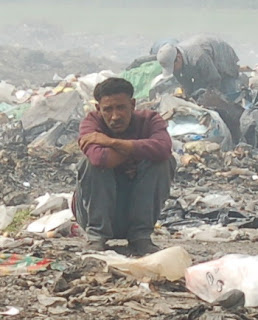 Just prior to Holy Week, a small group of people interested in children’s health issues wanted to see the worst place along the border. In the world of misery that is the US/Mexico border, the
Just prior to Holy Week, a small group of people interested in children’s health issues wanted to see the worst place along the border. In the world of misery that is the US/Mexico border, the Y et, this is a garbage dump—what more could one expect? A place of refuse, of junk, of all that we no longer want or deem useful. It is where we send things to rot.
et, this is a garbage dump—what more could one expect? A place of refuse, of junk, of all that we no longer want or deem useful. It is where we send things to rot.
What we don’t expect, although we know that they are there, are the garbage pickers. The men, women and children who busily rip open black plastic garbage bags, poke through piles of muck, looking for anything that might be of use. There are about 150 of them out and about on this day. “Business is kind of slow today,” one of them remarks.
The garbage pickers are friendly and talkative. They gather about us, anxious to talk about the topic of the day—their children’s health. There is an animated conversation about the best way to organize care. It is not a hospital board meeting, but the seriousness of the conversation and the urgency of the group would rival any such group.
As we drive off from the dump, we run across Armando, “El Piojo”, a fellow who has been coming out here to pick through the garbage for more than 27 years. Though his clothing is worn and torn and dirty, he is nevertheless immaculately dressed—his shirt buttoned up, his pantlegs tucked neatly into his boots, his hair combed. Why do you work here, I ask him. He wrinkles up his forehead and says, thoughtfully, sometimes I can make ten or even fifteen dollars a day. That is twice what they make in the General Motors’ factory. Not bad for an old man, he says, smiling in a bright-eyed way that, for a moment, at least, erases the stench, the flies, the hopelessness. He waves good bye and gently steps off into the piles of rubbish, intently looking down, searching for tomorrow’s daily bread.
and torn and dirty, he is nevertheless immaculately dressed—his shirt buttoned up, his pantlegs tucked neatly into his boots, his hair combed. Why do you work here, I ask him. He wrinkles up his forehead and says, thoughtfully, sometimes I can make ten or even fifteen dollars a day. That is twice what they make in the General Motors’ factory. Not bad for an old man, he says, smiling in a bright-eyed way that, for a moment, at least, erases the stench, the flies, the hopelessness. He waves good bye and gently steps off into the piles of rubbish, intently looking down, searching for tomorrow’s daily bread.